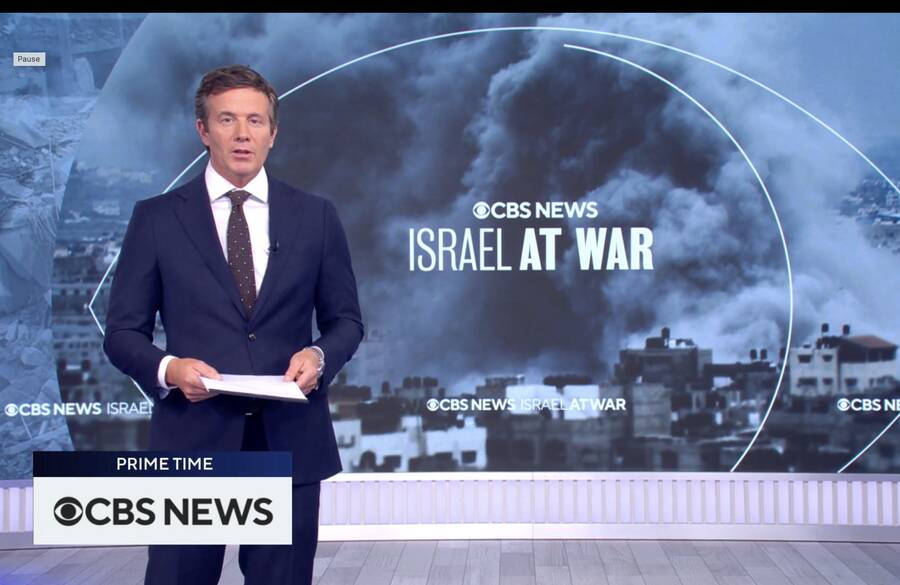Major News Networks Sideline Palestinian Analysts
Leading Palestinian commentators describe canceled appearances and segments pulled from CBS and CNN shows.

Jeff Glor anchoring Prime Time with John Dickerson on October 12th.
On the evening of October 12th, the Palestinian American legal scholar and human rights attorney Noura Erakat called into the CBS News Streaming show Prime Time with John Dickerson—which airs nightly on CBS’s website and apps, as well as on Pluto TV and Paramount—for a live interview on the human rights crisis caused by Israel’s bombing of Gaza. According to internal CBS discussions reviewed by Jewish Currents, employees at CBS had prioritized booking Erakat in part because the show had not included any Palestinian guests in its coverage of the region during the previous three days. But while the interview aired live to the network’s thousands of streaming viewers, CBS omitted the footage—in which Erakat sharply criticized the anchor’s framing of Israel’s actions—from the version of the episode published online that night, and declined to post a standalone clip of the interview, as it usually would. According to a schedule reviewed by Jewish Currents, the interview was initially listed in the 7:30 pm slot, between segments on Senator Bob Menendez and Israel/Palestine-related protests across the United States. But while those reports appear in the version of the show available online, Erakat’s remarks do not.
Speaking with Jewish Currents, Erakat described her Prime Time interview as “a really tense back-and-forth.” “Rather than just answer questions about how bad things are,” she said, “I talked about media responsibility for perpetuating racist and Islamophobic tropes that have basically fomented war.” When Jeff Glor, the anchor filling in for Dickerson, described Hamas’s October 7th attacks on Israeli civilians as “barbarian,” Erakat asked why the same term wasn’t used to describe actions by Israel, noting that Israeli soldiers shot and killed her cousin three years ago at a checkpoint in the West Bank, and Israel still has not returned his body. Further, when Glor started to say that Gaza was facing Israel’s current bombing campaign “because Hamas started it,” Erakat asked if he thought Israel’s war crimes in Gaza were justified, leading Glor to backtrack.
According to a source familiar with the internal decision-making at the network, CBS News Streaming’s senior vice president Anthony Galloway, as well as vice president and managing editor Robert Gifford, made the decision not to post the clip on the network’s website because they thought that the interview was too combative and that it had made Glor, the anchor, look bad. The source said the decision was also backed by CBS’s standards team, which is responsible for maintaining the network’s editorial standards across all CBS outlets. But Erakat called the network’s non-publication of the interview “a pointed decision.” “They wanted me to be up there to lament our dead, but not to establish international responsibility for [their deaths],” she said. CBS’s press representatives did not respond to a request for comment.
Erakat is only one of several Palestinian commentators who spoke to Jewish Currents about being marginalized by a major news network in the past week. On Friday, October 13th, the day after Erakat’s CBS interview, a producer for the weekend edition of the CNN show This Morning reached out to Yousef Munayyer, a Palestinian American writer and political analyst, inviting him to appear on TV the following morning. After Munayyer agreed, he received a time slot and a link to join the program. But he soon received a phone call from the show’s producer, who asked him about his planned talking points. Munayyer told Jewish Currents that the producer kept him on the phone for an hour, and seemed to have little knowledge about Israel/Palestine. He recalled that she asked, for example, “This Hamas group, they’re new, right?” Munayyer said he told her that he hoped to “raise awareness about the mass atrocities” that Israel was continuing to commit in its attacks on the Gaza Strip, but that she repeatedly returned to the question of his position on the October 7th Hamas attacks. “I told her that [the attacks] were horrifying and that we need to do all we can to prevent further killing now. And it didn’t seem to be what she wanted to hear,” Munayyer said. “She said that they would be looking more for analysis, and I told her this is my analysis of the situation.” A few hours later, he received word that the show had changed plans and couldn’t fit him in for the segment.
Munayyer said that while he understood that news programs sometimes need to change their plans for coverage, “the way the conversation [with the producer] went, and the fact that the change came after that conversation, made it feel like there was a screening happening and they were looking for guests who would only say specific things and not say other things.”
Omar Baddar, a Palestinian American political analyst, described a similar experience with CNN International. Baddar was invited to appear on a CNN show on the evening of Saturday, October 14th, and was told that the timing of his appearance would be confirmed shortly. In a follow-up email, however, the show’s producer asked what he planned to say. Baddar shared an outline of his planned comments, which criticized the US for supporting Israel’s attacks on civilians in Gaza and argued that there would be no military solution to the conflict between Israel and Hamas. In the following two days, the producer repeatedly postponed the interview before saying the team would have to check on whether Baddar could be scheduled later in the week. “I understand being bumped when there’s a good reason,” Baddar told Jewish Currents. “But I was confirmed, then they asked me about what I planned on saying, and then when I told them, the communication was, ‘We can’t squeeze you in.’” A press representative for CNN declined to comment.
While several Palestinians have been featured on major US networks since October 7th—including Palestinian National Initiative secretary Mustafa Barghouti in multiple CNN interviews and former Palestine Liberation Organization spokesperson Diana Buttu on CNN International—Erakat, Munayyer, and Baddar’s experiences are part of the US media’s long history of marginalizing Palestinian voices. A 2020 +972 Magazine piece by the historian Maha Nassar found that since 1979, only 46 of 2,490 New York Times op-eds discussing Palestine were authored by Palestinians.
And Palestinian journalists, as well as Arab and Muslim journalists more generally, often find that this marginalization intensifies during periods of active conflict in Israel/Palestine. Last Friday, Semafor reported that in the week following the Hamas attacks, MSNBC had temporarily removed or postponed host appearances by three Muslim journalists—Mehdi Hasan, Ayman Mohyeldin, and Ali Velshi. Anonymous MSNBC staff members told Semafor that they were concerned these shifts were attempts to sideline anchors with “some of the deepest knowledge of the conflict,” although the network insisted that all such scheduling moves were coincidental. Semafor also reported that MSNBC executives had previously been uneasy about critical coverage of Israel during the country’s 2021 bombing of Gaza, with some “privately express[ing] discomfort” with coverage that highlighted the impact on Palestinian civilians. According to reporting by Slate in 2021, several journalists who covered Israel/Palestine for major American newspapers in the 2010s similarly faced pressure to moderate their coverage. Journalists recalled that senior managers often interfered with their reporting on what was happening in Gaza; one said that because of that pressure, they had “some trouble reporting the truth” of what they were witnessing on the ground. One major newspaper reporter recalled that their editors would challenge their firsthand accounts of Palestinian casualties “in a way the IDF’s point of view was never scrutinized.”
Those who spoke to Slate said they noted a potential tide turning in 2021, when Israel’s efforts to displace Palestinians from the East Jerusalem neighborhood Sheikh Jarrah drew international sympathy for the Palestinian cause, which increased during Israel’s bombing campaign against Gaza. “Veteran journalists on Sky News are each day remarking on the context, focusing on the disproportionate nature [of Israel’s offensive], and using terminology like ethnic displacement or ethnic cleansing,” Palestinian journalist Ahmed Shihab-Eldin said in the piece. But Laura Albast, an independent journalist who works as a senior editor for digital strategy at the Institute for Palestine Studies, told Jewish Currents she fears that progress has been lost, with news outlets falling back on familiar narratives in which the framing is America versus “terrorists.” “I think all that work we’ve done for years was in vain—it’s been thrown out the window,” she said. “Media outlets are playing on Islamophobic and racist tropes.”
US television networks are also under pressure from pro-Israel voices. On October 9th, appearing on MSNBC’s Morning Joe, ADL CEO Jonathan Greenblatt accused the network of downplaying Hamas’s attacks on Israel. Hamas agents “are not fighters . . . they are not militants, and I am looking right at the camera, they are terrorists,” he said. He chastised the network for showing “these pictures of missiles or the rubble in Gaza,” instead of talking to the family members of Israelis who had been killed or taken hostage, and said they should stop calling Israel’s strikes on Gaza “a retaliation,” and instead should frame the bombardment as a “defensive measure.” Yet the networks have not shied away from airing ardent Israel advocacy. While CBS did not post Erakat’s interview, the network did post a conversation conducted the same day in which veteran Israeli diplomat Shahar Azani described Hamas as “in a way worse than the Nazis because the Nazis tried to hide their atrocities and Hamas posted it on their social media” and repeated as-yet-unverified claims about the militant group having beheaded babies.
For Erakat, what happened to her interview is part of a pattern. “I do see that they are bringing on people who have lost family in Gaza,” she said, “but they have diminished the analysts who want to explain the context.”
Mari Cohen is the associate editor of Jewish Currents.

